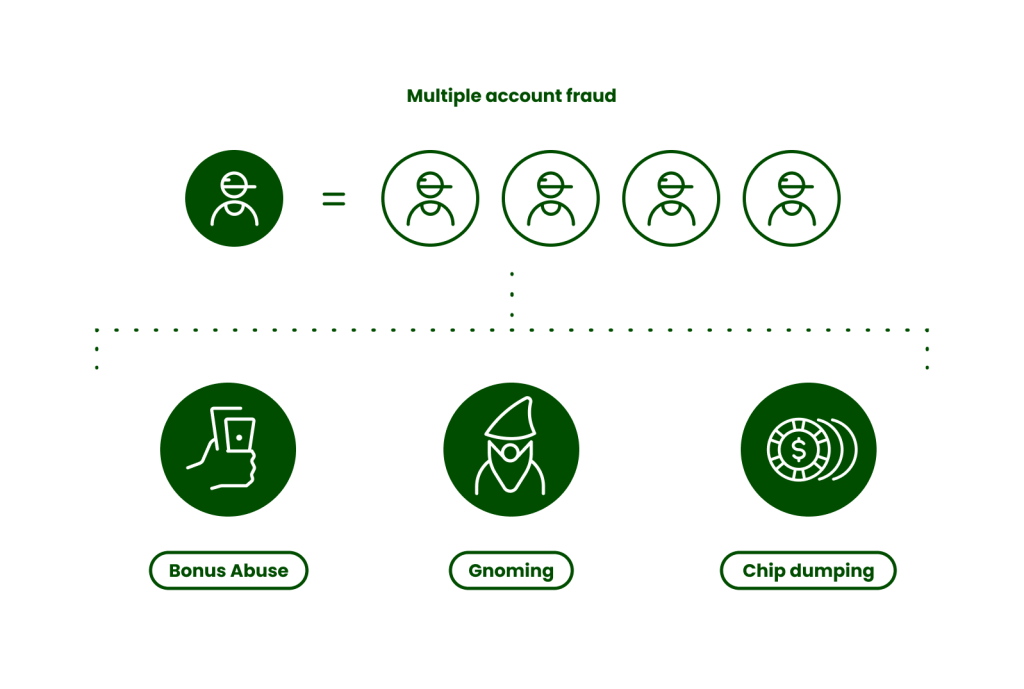What Is Chip Dumping?
Chip dumping is when a gambler intentionally loses chips or credits to another player in order to transfer funds to that player’s account. This other player could be someone colluding with the chip dumper, or they could be using multiple accounts (multi-accounting). This is more commonly seen in poker, but can sometimes apply to other types of game.
In online real-money gaming, fraudsters may attempt to use chip dumping to launder money, or to abuse bonus offers and loyalty schemes, among other reasons. As such, it is important for iGaming companies to be aware of the practice and to do all they can to prevent it as part of their anti-money laundering measures as well as their fraud prevention.
SEON’s advanced APIs help keep iGaming fraudsters out of your system, minimizing ROI damage from bonus abuse and multiaccounting. See what they can do for you.
Ask an Expert
How Does Chip Dumping Work?
Chip dumping is a relatively easy way for fraudsters to hide the trail of money they have come by through illegal means, or conduct other types of abuse. It works as follows:
- The fraudsters set up online gaming accounts. If there is just one fraudster, they will set up multiple accounts using different identities, all of which the fraudster controls. Using a virtual private network or Tor when setting up the accounts enables the fraudster to hide the fact they are connected.
- The fraudsters join a game and one player intentionally loses their chips to a pre-agreed other player. A third player account may also be used to further hide what is taking place.
- The player who has “won” cashes out and receives the freshly laundered money into their account.
In this way, a player can illegally transfer money from one account to another, layering it in the process. They can also complete playthrough or other requirements to defraud the gaming website.
Is Chip Dumping Illegal?
Not in the strict sense but it is certainly not tolerated. There is no law that defines this act as illegal. However, it is illegal to launder money, so when chip dumping is a money laundering method, it is most certainly against the law.
In the case of chip dumping for bonus abuse, this is almost always against a platform’s Terms and Conditions. It will get you banned from the platform, or worse.

The Consequences of Chip Dumping
Chip dumping and other forms of specialized fraud, such as matched betting, have a major impact on the iGaming industry. They are costing companies time and money, both as a result of the practices themselves and due to the need to implement measures to fight them.
Overall, digital fraud grew significantly across the gambling industry in the United States in 2021, with an increase of 19.2% between 2020 and 2021. When you extrapolate that out and consider the global online gambling market is projected to grow at a CAGR of 11.7% from 2022 to 2030, the problem quickly becomes apparent.
In terms of individual games, chip dumping can detract from the quality of the gaming experience for players who aren’t involved in the collusion.
What Is Chip Dumping Used For?
Fraudsters use chip dumping for two main reasons: money laundering and bonus abuse.
- Money laundering: Chip dumping is a means for fraudsters to move dirty money from one account to another. This helps to hide the money’s trail and to “clean” it, with the online gaming account effectively functioning similar to a bank drop account.
- Bonus abuse: Chip dumping can also be used as a form of iGaming bonus abuse, where players sign up for free bonus offers then “lose” money to their complicit accounts in order to cash out the offers, thus ostensibly fulfilling their playthrough requirements – but without actually doing so.
Both of the above, as well as adjacent schemes, are an issue for the iGaming operator, though AML-related chip dumping is much more dangerous. Bonus abuse is more likely to simply go against the platform’s Terms and Conditions, while money laundering enablement is a criminal offense.
SEON’s advanced APIs help keep iGaming fraudsters out of your system, minimizing ROI damage from bonus abuse and multiaccounting.
Ask an Expert
How to Stop Chip Dumping
Companies that are committed to stopping chip dumping, along with other forms of fraud, need a comprehensive prevention strategy that addresses all aspects of iGaming fraud. These include regular updates to ensure that the latest fraud attempts are catered for by the given strategy.
There are two elements to this: preventing chip dumping from happening and detecting it if or when it does take place.
To prevent chip dumping from happening, companies can put measures in place to detect high-risk customers. Due diligence procedures that include KYC onboarding can help to ensure customers are who they say they are. They are also key in identifying customers who may present more of a money laundering risk.
Companies can also implement measures to detect chip dumping while it is taking place, for instance by flagging repeat losses to the same opponent or inconsistently sizeable bets. Fraudsters vary in the sophistication of their chip dumping approach, which can make some harder to detect than others. However, with the right combination of knowledge sharing and fraud prevention and detection tools, companies can put robust defenses in place.








